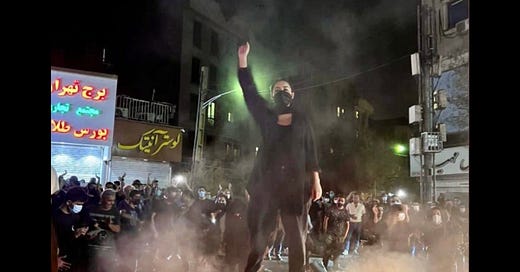US citizen killed in Iran strikes in Iraq, State Dept says
“We can do both,” speak out for Iranian human rights and pursue a nuclear deal, US Iran envoy said in radio interview Sept. 28.
The State Department today confirmed that a U.S. citizen had been among thirteen people killed in Iranian rocket and drone strikes into Iraqi Kurdistan yesterday, launched as the Iranian government sought to clamp down on over ten days of protests at home in the wake of the death of Mahsa Amini following her arrest by Iran’s so-called morality police.
“We can confirm that a U.S. citizen was killed as a result of a rocket attack in the Iraqi Kurdistan region yesterday,” State Department principal deputy spokesman Vedant Patel told journalists in a department briefing call today (Sept. 29). Citing privacy considerations, he declined to further discuss the person’s identity.
“I want to reiterate that we condemn Iran’s violations of Iraq’s sovereignty and territorial integrity,” Patel said.
“These protests are not at all about the United States,” Patel said. “This is about the Iranian government and its efforts to cut or disrupt access to the internet, its efforts to crack down on peaceful protestors, its efforts to infringe on basic human rights. That’s what these protests are about. It is not about the United States.”
Iran’s strikes into Iraqi Kurdistan reflect the Islamic Revolutionary Guards Corps’ mindset that the domestic unrest is a vulnerability that foreign enemies could try to exploit, said Iran expert Abdolrasool Divsallar.
“Tehran thinks a possible military attack can occur amid domestic unrest,” Divsallar, an Iran expert with the Middle East Institute and Cattolica Universita in Milan, Italy, wrote in a Twitter thread.
“Tehran…believes an external enemy may see an opportunity to strike amid a domestic crisis,” he wrote.
The strikes also have a domestic audience, he said. They aim “to show the protestors the decisiveness of the Islamic Republic….It is viewed as a PSYOP that can manage public perception of the regime’s power.”
An Iranian contact in Tehran said today (Sept. 29) that it was his impression that large scale protests in the wake of the killing of Mahsa Amini have mostly subsided, and that Tehran saw its first day without demonstrations in more than a week. He said cellular and cable broadband internet have returned to full service, at least in Tehran, but that Instagram and WhatsApp are still censored. He said that several athletes and celebrities that had expressed support for the protesters have been arrested.
U.S. Central Command on Wednesday condemned the IRGC attacks in Iraqi Kurdistan, and said US forces had brought down an Iranian Mojer-6 unmanned drone headed in the direction of the Iraqi Kurdish capital of Erbil.
“No U.S. forces were wounded or killed as a result of the strikes and there is no damage to U.S. equipment,” Centcom spokesman Joe Buccino said in a press release on Wednesday (Sept. 28).
“At approximately 2:10pm local time [Sept. 28], U.S. forces brought down an Iranian Mojer-6 Unmanned Aerial Vehicle headed in the direction of Erbil as it appeared as a threat to US Centcom forces in the area,” Buccino said.
Separately, the State and Treasury Departments today announced further sanctions on ten entities they said were involved in the sale of Iranian petroleum and petrochemical products, including two based in China, and others in the United Arab Emirates, India, Hong Kong and Iran.
“So long as Iran refuses a mutual return to full implementation of the Joint Comprehensive Plan of Action, the United States will continue to enforce its sanctions on the sale of Iranian petroleum and petrochemical products,” Under Secretary of the Treasury for Terrorism and Financial Intelligence Brian E. Nelson said in a press release on the action.
These economic sanctions “are reversible in the event of Iran’s return to JCPOA compliance,” the Treasury press release continued.
They add to “designations imposed last week against the so-called morality police and other law enforcement organizations and individuals responsible for the death in custody of Mahsa Amini and the violent repression of the protests that have followed.”
US Iran envoy Rob Malley said Wednesday that the policy of the United States towards Iran is not regime change, even as the US administration speaks up in support of the rights of Iranians, and also tries to negotiate a revival of the nuclear deal.
“This is not a policy that is trying to fuel instability of Iran and try to topple the regime and the government,” Malley said in an interview with The World radio program Wednesday. “It is a policy that is trying to be true to [US values] that people have the right to exercise fundamental freedoms.”
“Some people have asked us why would we continue to pursue a nuclear deal in the face of the repression of this Iranian government,” Malley said.
“It didn’t take what just happened, with the tragedy that occurred [with the death of Mahsa Amini] for us to know what this Iranian government is about,” he said. “The reason we’re pursuing a nuclear deal is we don’t want this government to have its hands on a nuclear weapon. It’s really as simple as that. And so that remains a fundamental national security interest of the United States. And yes, we can do both things at the same time.”



